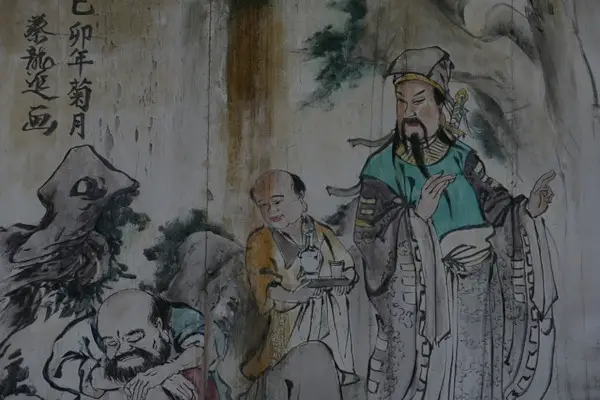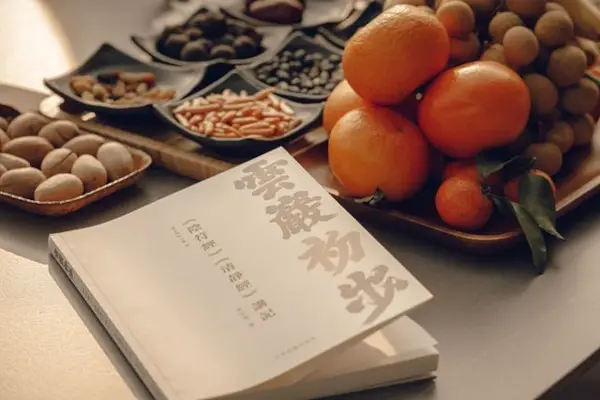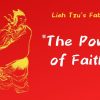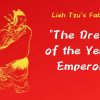
In the quest for personal growth, we often look to the latest trends and self-help fads. But what if the key to a more fulfilling life lies not in the newest book, but in ancient wisdom that’s stood the test of time?
This article explores how Confucian, Taoist, and Buddhist philosophies, though originating thousands of years ago, offer surprisingly relevant insights for navigating the complexities of modern life. By integrating elements from each tradition, you can cultivate a holistic approach to personal growth, fostering resilience, inner peace, and a life filled with purpose.
Let’s embark on a journey through ancient Chinese wisdom and discover how it can empower you to thrive in the here and now.
Core Virtues and Values in Confucianism, Taoism, and Buddhism
| Virtue/Value | Confucianism | Taoism | Buddhism |
| Benevolence | Emphasizes compassion, kindness, and concern for others | Advocates for empathy, harmony, and non-interference | Cultivates compassion (Karuna) and loving-kindness (Metta) |
| Harmony | Values social harmony, order, and respect for authority | Prioritizes natural harmony, balance, and spontaneity | Seeks harmony with oneself, others, and the world |
| Integrity | Upholds honesty, sincerity, and moral rectitude | Values authenticity, simplicity, and inner truth | Embraces honesty, ethical conduct, and non-harm |
| Wisdom | Promotes learning, self-cultivation, and moral development | Embraces natural wisdom, intuition, and non-action | Pursues wisdom through study, insight, and meditation |
| Humility | Advocates for humility, modesty, and deference | Encourages humility before the mysteries of the Tao | Cultivates humility in recognizing the interconnectedness of all beings |
Confucianism in modern life
Confucianism, one of the most influential philosophies in Chinese culture, offers valuable insights for modern personal growth. At its core, Confucianism emphasizes ethics and relationships, which are crucial for cultivating meaningful connections and navigating ethical dilemmas in personal and professional contexts.
Ren 仁 (Benevolence) and Xiao 孝(Filial Piety)
Two key Confucian principles, Ren (仁) and Xiao (孝), guide individuals in their interactions with others. Ren, often translated as “benevolence” or “humaneness,” emphasizes empathy, kindness, and compassion towards oneself and others. By cultivating Ren, individuals can foster deeper connections and enhance their ability to understand and empathize with others’ perspectives.
Xiao, or filial piety, is another essential Confucian principle that emphasizes respect, care, and loyalty towards one’s family and ancestors. This principle encourages individuals to honor their roots and maintain strong family bonds, which can provide a sense of belonging, support, and stability. (1)
Navigating Ethical Dilemmas
Confucianism also offers a framework for navigating ethical dilemmas. By prioritizing the greater good, individuals can make decisions that align with their values and promote harmony in their relationships. This approach emphasizes the importance of balancing the needs and interests of all parties involved, rather than prioritizing one’s own interests above others.
In today’s fast-paced world, Confucian principles can help individuals cultivate meaningful relationships, foster empathy, and navigate ethical dilemmas. By prioritizing ethics and relationships, individuals can build a strong foundation for personal growth and development, which can lead to greater fulfillment and success in both personal and professional contexts.
“When we see men of a contrary character, we should turn inwards and examine ourselves.” – Confucius
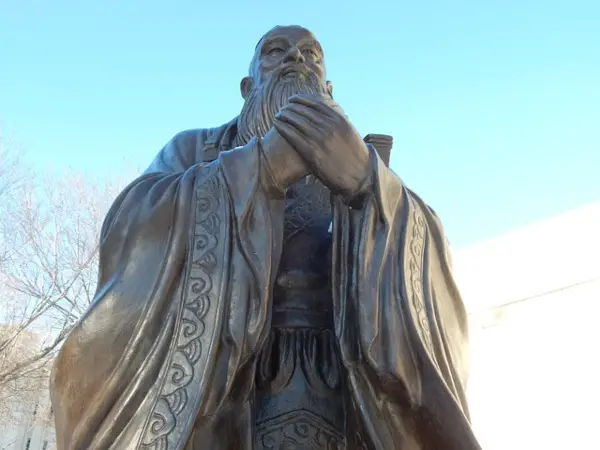
Lifelong Learning
Confucianism places a significant emphasis on lifelong learning as a fundamental aspect of personal growth and development. According to Confucian educational philosophy, learning is not merely a process but a lifelong journey towards self-cultivation and the pursuit of knowledge.
Jun Zi 君子 and Sage 聖: Models of Lifelong Learning
Confucius introduced the concepts of Jun Zi ( 君子) and Sage(Sheng – 聖) to exemplify ideal human models who embody lifelong learning as a method and process. The Jun Zi represents a realistic educational end, emphasizing that continuous learning and education are essential for individuals to realize and practice their true nature, enabling them to live harmoniously in various aspects of life.
In modern society, the emphasis on lifelong learning aligns with the need for continuous personal and professional development. Organizations like the United Nations advocate for lifelong learning to ensure sustainable development, emphasizing the importance of acquiring practical skills, knowledge, and attitudes that promote ongoing growth and adaptability in a rapidly changing world. (2)
Confucius believed that education should be life-oriented, focusing on developing good habits that facilitate harmonious interactions within society. Learning should be derived from societal needs and geared towards solving real-life challenges, emphasizing the practical application of knowledge and skills acquired through continuous learning.
Reflective Learning and Critical Thinking
Confucius emphasized the importance of reflective learning and critical thinking, highlighting the need for learners to engage in thoughtful examination before making judgments. By combining learning with thinking, individuals can digest knowledge effectively, develop practical skills, and contribute meaningfully to society.
For Confucius, education’s objective is to achieve a unity of self and the world, representing the highest stage of learning. Continuous improvement through repeated practice, regular reviews, and the integration of learning with thinking are essential for individuals to acquire mastery, develop values, and interact effectively within their communities.

Leadership and Social Responsibility
Confucianism’s influence on leadership and social responsibility in modern China reflects a deep-rooted connection between ethical virtues and effective leadership practices. Despite historical shifts and economic changes, Confucian principles continue to inspire ethical decision-making and community engagement among contemporary business leaders.
Historical Context and Ethical Stance
During turbulent periods in China’s history, Confucian business leaders emphasized the importance of social responsibility and ethical leadership. These leaders viewed their vocation as a calling to uphold the culturally innate morality of Confucianism while integrating modern management methods. Their ethical stance was characterized by a sense of patriotism, emphasizing the significance of taking political and social responsibility for the greater good of society.
The evolution of China’s economic landscape, from planned economies to liberalizing reforms, presented challenges for Confucian business leaders. The emphasis on profit maximization and instrumental rationality in modern business discourse led to a decline in the explicit identification of business leaders as Confucian. However, Confucian virtues like filial piety, honesty, and integrity remain prominent ideals among Chinese people, reflecting a continued reverence for ethical values in contemporary society.
Contemporary Applications and Ethical Leadership
Despite the changing business environment, some contemporary business leaders in China have embraced Confucian virtue ethics as a guiding principle for their conduct. Through moral choices that prioritize righteousness over profit alone, these leaders have demonstrated a commitment to ethical decision-making and social responsibility.
By establishing schools and societal initiatives to improve communities and emphasizing care for their employees, Confucian business leaders exemplify a deep sense of righteousness and compassion in their leadership approach.
“The superior man is modest in his speech but exceeds in his actions.” – Confucius
Harmonious Business Practices
Confucian business leaders often adopt indirect and harmonious approaches to competition, seeking mutual benefit and cooperation rather than engaging in aggressive rivalry. By focusing on complementary interests, technological innovation, and market dynamics, these leaders promote a cooperative advantage that fosters harmony and mutual growth in competitive environments.
This approach reflects the enduring influence of Confucian ethics on business behavior and the importance of maintaining ethical standards in the pursuit of success.
The research findings underscore the enduring relevance of Confucian ethics in guiding contemporary business leaders toward ethical decision-making, social responsibility, and harmonious interactions in the business world. Despite the challenges and changes in China’s economic landscape, the ethical legacy of Confucianism continues to shape leadership ideals and inspire a commitment to virtuous conduct among business leaders. (3)(4)
Related reading: The Importance of “Guanxi” 关系 (Relationships) in Chinese Society – Opens in new tab
Taoist principles for modern living
Taoism, an ancient Chinese philosophy, offers valuable insights for modern living, particularly in the realm of simplicity. By embracing the Taoist concept of Wu Wei (non-action) and the practice of simplicity, individuals can declutter their lives, reduce stress, and cultivate inner peace amidst the complexities of modern life.
Wu Wei: Non-Action and Effortless Action Wu Wei, a central concept in Taoism, can be translated as “non-action” or “effortless action.” It involves aligning oneself with the natural flow of things, letting go of desires and attachments, and allowing life to unfold naturally. In today’s fast-paced world, embracing Wu Wei can lead to greater efficiency, creativity, and a sense of calmness in daily life. Practical Applications of Wu Wei in Modern Life
- Work and Productivity: Practicing Wu Wei at work involves finding a balance between effort and surrender, allowing tasks to unfold naturally while still being proactive and engaged. This approach can lead to increased creativity, better problem-solving, and a more fulfilling work experience.
- Decision-Making: When faced with difficult decisions, applying Wu Wei means letting go of the need for control and allowing the situation to unfold naturally. By trusting in the process and remaining open to possibilities, individuals can make more intuitive and effective decisions.
- Personal Relationships: In personal relationships, Wu Wei encourages individuals to let go of expectations and preconceived notions, allowing relationships to develop organically and authentically. This approach can foster deeper connections, greater understanding, and increased empathy.
Simplicity: Decluttering and Inner Peace. Taoism also emphasizes the importance of simplicity in decluttering one’s life, reducing stress, and cultivating inner peace. By adopting a minimalist lifestyle and focusing on essentials, individuals can create a more harmonious environment that supports their well-being.
“Simplicity, patience, compassion. These three are your greatest treasures.” – Lao Tzu
Practical Applications of Simplicity in Modern Life
- Minimalist Living: Embracing minimalism involves simplifying one’s living space, reducing material possessions, and focusing on experiences rather than accumulating more “stuff.” This approach can lead to a greater sense of freedom, reduced stress, and increased happiness.
- Time Management: Practicing simplicity in time management involves prioritizing tasks, setting realistic goals, and avoiding overcommitment. By focusing on what truly matters, individuals can achieve a more balanced and fulfilling life.
- Digital Detox: In today’s technology-driven world, simplicity can also mean taking breaks from digital devices and social media. By disconnecting periodically, individuals can reduce stress, improve focus, and enhance their overall well-being.
Incorporating Taoist principles of simplicity and Wu Wei into modern life can lead to a more balanced, fulfilling, and peaceful existence, helping individuals navigate the complexities of the modern world with grace and ease.
Flow and Spontaneity
Modern life often gets bogged down in schedules, routines, and the pressure to optimize every moment. Taoism, however, offers a liberating perspective that celebrates flow and the power of spontaneity. These principles can be particularly beneficial in today’s fast-paced, complex world.
In Taoist philosophy, the Uncarved Block (pu 朴) represents a state of simplicity, spontaneity, and naturalness. The book “The Tao of Pooh” (Aff.link)uses Winnie the Pooh as an example of someone who embodies the principles of the Uncarved Block, living in harmony with nature, being content with what he has, and approaching life with a sense of wonder and curiosity.
Embracing the Flow: The Tao Te Ching, a foundational Taoist text, emphasizes living in harmony with the natural flow of the universe, a state sometimes called “being in the Tao.” Imagine a river effortlessly carving its path through the landscape – this is the essence of flow.
When you align your actions with your intuition and let go of rigid planning, you can tap into a sense of effortless action and experience a deeper connection to the present moment. By reflecting on Pooh’s carefree and spontaneous nature, readers can begin to see how they too can live more in tune with the Tao.
“Nature does not hurry, yet everything is accomplished.” – Lao Tzu
The Power of Spontaneity: Spontaneity isn’t about recklessness, but about embracing life’s unexpected moments. Step outside your comfort zone occasionally – take an unplanned walk in nature, strike up a conversation with a stranger, or explore a new hobby. These moments of spontaneity can spark creativity, lead to unexpected connections, and inject a dose of joy into your daily routine.
Doing Nothing and Accomplishing Everything
Taoism also emphasizes the concept of “doing nothing and accomplishing everything.” This principle encourages surrendering to the flow of life and being open to new possibilities, allowing things to unfold naturally. By embracing this approach, one can achieve success and fulfillment without constantly striving and struggling.

Harmonizing with nature
In our fast-paced, technology-driven world, it’s easy to become disconnected from nature. However, Taoism places deep reverence on the natural world, viewing it as a source of inspiration, rejuvenation, and a powerful teacher. Reconnecting with nature offers a multitude of benefits for modern individuals.
Taoism teaches that living in harmony with nature is essential for spiritual well-being and overall well-being. The Circle of Tao, a central concept in Taoism, represents the experience of oneness with all life, which often occurs in nature. This sense of unity and wholeness can be found in moments of deep connection with the natural world, such as watching a sunset, hiking in the mountains, or appreciating works of art.
Taoist Environmental Ethic
Taoism provides a basis for a relationship between humans and nature, on which a modern environmental ethic can be built. By recognizing the interconnectedness of all things and the dynamic movement towards balance in nature, individuals can cultivate a more harmonious relationship with the natural world.
Integrating Taoist Principles into Daily Life
To incorporate Taoist principles of harmonizing with nature into daily life, consider the following practices:
- Spend Time in Nature: Regularly spend time in nature, whether it’s taking a walk in the park, hiking in the mountains, or simply sitting in your backyard. Allow yourself to fully experience the beauty and power of the natural world.
- Reflect on the Uncarved Block: Take time to reflect on the idea of the Uncarved Block and how it relates to your own life. How can you simplify your life and approach it with a sense of wonder and curiosity?
- Cultivate Awareness: Develop a deeper awareness of the natural world by observing the patterns and cycles of nature. This can help you align yourself with the natural flow of the universe and cultivate a greater sense of balance and harmony in your life.
- Embrace Wu Wei: Practice living in harmony with the natural flow of life. Let go of the need to force outcomes and instead allow things to unfold naturally.
- Cultivate Simplicity: Focus on living a simple and uncomplicated life. Let go of unnecessary attachments and desires, and find contentment in the present moment.
- Practice Non-Action: Embrace the concept of “doing nothing and accomplishing everything.” Allow yourself to rest and rejuvenate, and trust that the universe will provide what you need.
Related reading: Finding Personal Growth Lessons In Ancient Chinese Tales – Opens in new tab
Buddhist practices for contemporary well-being
Mindfulness in daily life
Buddhist mindfulness practices, such as mindfulness meditation and mindful living, offer valuable tools for individuals seeking to cultivate present moment awareness, reduce anxiety, and enhance overall well-being in the midst of hectic modern lifestyles.
Mindfulness Meditation: Cultivating Present Moment Awareness
Mindfulness meditation is a core practice in Buddhism that involves focusing on the present moment without judgment. By observing thoughts, emotions, and sensations as they arise, individuals can develop a deeper awareness of their inner experiences and the world around them. This practice can help reduce stress, increase focus, and promote emotional well-being.
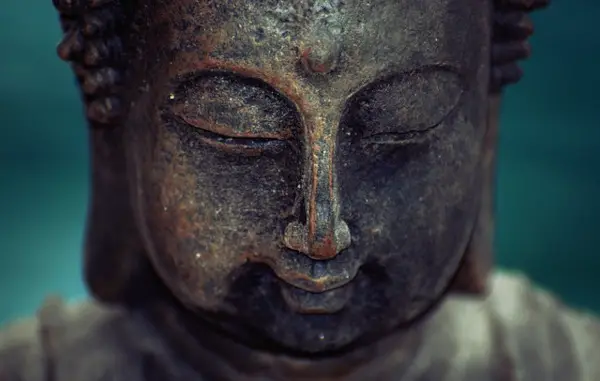
Mindful Living: Integrating Mindfulness into Daily Life
Mindful living extends the practice of mindfulness beyond meditation sessions and into everyday activities. It involves bringing a sense of awareness and presence to each moment, whether it’s eating, walking, or interacting with others. By being fully engaged in the present moment, individuals can reduce anxiety, improve concentration, and enhance their overall quality of life.
Benefits of Mindfulness in Daily Life
- Cultivating Present Moment Awareness: By practicing mindfulness in daily life, individuals can develop a greater sense of presence and focus, allowing them to fully engage with each moment and experience life more deeply.
- Reducing Anxiety: Mindfulness practices help individuals become more attuned to their thoughts and emotions, allowing them to respond to stressors with greater clarity and calmness. This can reduce anxiety and promote emotional resilience.
- Enhancing Overall Well-Being: Mindfulness in daily life can lead to a greater sense of peace, contentment, and fulfillment. By embracing the present moment and letting go of worries about the past or future, individuals can experience a profound sense of well-being.
“Do not dwell in the past, do not dream of the future, concentrate the mind on the present moment.”- Buddha
Compassion and altruism
Buddhism emphasizes the importance of cultivating compassion (Karuna) and loving-kindness (Metta) towards oneself and others. These qualities foster resilience, empathy, and meaningful connections in an interconnected world.
Compassion, loving-kindness, altruism, and a sense of brotherhood and sisterhood are the keys not only to human development but also to planetary survival. These qualities are essential for our happiness, progress, and fulfillment in life. They are necessary for our success, whether in personal or professional spheres, and for the attainment of full enlightenment.
Compassion: A Firm Commitment Founded on Reason
Compassion is not just an emotional response but a firm commitment founded on reason. It is a genuine concern for the well-being of others, regardless of whether they are friends or enemies. It is a commitment to help others overcome their suffering and achieve happiness.
This kind of compassion is the ultimate source of success in life, as it brings inner strength, confidence, and a sense of caring for others without any barriers.
Developing compassion is not easy, but it is necessary for our happiness and the happiness of others. It requires recognizing the equality of all beings in their desire for happiness and their right to overcome suffering. It also requires developing a sense of universal altruism and a feeling of responsibility for others’ well-being. (5)

Altruism: The Ultimate Expression of Compassion
Altruism is the ultimate expression of compassion. It is the willingness to go out on a limb to help others change their suffering. However, it is important to avoid the toxicity of sympathy and the risks of altruism. Instead, we should cultivate compassion in every interaction while acting in a way that is consistent with our capacity.
Incorporating Buddhist Compassion and Altruism into Daily Life
To incorporate Buddhist compassion and altruism into daily life, consider the following practices:
- Develop a Clear Understanding of Compassion and Love: Recognize that compassion and love are positive thoughts and feelings that give rise to essential things in life, such as hope, courage, determination, and inner strength.
- Cultivate Empathy and Connection: Develop empathy for others by recognizing their common humanity and their desire for happiness and freedom from suffering. Connect with others through acts of kindness and caring.
- Practice Loving-Kindness Meditation: Cultivate loving-kindness towards oneself and others through meditation. Visualize oneself and others surrounded by love and happiness.
- Engage in Acts of Altruism: Practice altruism by helping others in need, whether through volunteering, donating to charity, or simply lending a helping hand to a neighbor.
- Cultivate Inner Strength and Resilience: Develop inner strength and resilience through meditation, mindfulness, and self-care. This will enable one to extend one’s sense of caring to others without any barriers.
Related reading: How to Use Yin and Yang Philosophy for a Balanced and Harmonious Life – Opens in new tab
Impermanence and acceptance
Buddhist teachings on impermanence (Anicca) and the acceptance of life’s inherent flux can offer solace, perspective, and a sense of equanimity in the face of personal challenges, loss, and uncertainty (6) (7) (8).
Embracing Impermanence: A Key to Inner Peace and Joy
The Buddha’s teachings on impermanence emphasize the idea that our life is pervaded by duhkha, a word that often gets translated as “suffering” but is better rendered as “dissatisfaction” or “existential unease.”
The Suffering in general is caused by a mismatch between desire and reality. We suffer when what we are or have does not match up with what we want to be or want to have. To relieve suffering, we must change either reality or our desire (6).
The law of impermanence is a fact of reality that cannot be changed; everything that comes to be eventually passes away. The Buddha teaches that the path to peace and joy requires that we embrace change rather than pine for permanence.
Embracing impermanence is a key to inner peace and joy. By recognizing that everything is temporary, we can learn to appreciate the present moment and let go of attachments that cause suffering. This practice can help us find a sense of equanimity in the face of personal challenges, loss, and uncertainty (6).

The Impermanence of Things: A Source of Appreciation for Life
The impermanence of things is a natural part of their perfect “Buddha nature” and a source of appreciation for life. By recognizing that everything is constantly changing, we can learn to cherish the moments we have and appreciate the beauty of life in each moment.
The Lack of an Individual Self: Identification with the Interconnected Universe
The lack of an individual self-points towards identification with the interconnected universe. By recognizing that we are not separate from the world around us, we can cultivate a sense of compassion and interconnectedness with all beings.
Suffering as Emotional Clinging: Non-Judgment and Non-Striving
Suffering is only a result of emotional clinging, not a “value judgment” on the nature of impermanent worldly existence. By practicing non-judgment and non-striving, we can cultivate a sense of acceptance and equanimity in the face of suffering.
Incorporating Impermanence and Acceptance into Daily Life
To incorporate impermanence and acceptance into daily life, consider the following practices:
- Cultivate Present Moment Awareness: Develop a mindfulness practice that emphasizes the present moment. This can help you appreciate the beauty and preciousness of life in each moment.
- Embrace Change: Recognize that everything is temporary and embrace change rather than pining for permanence. This can help you find inner peace and joy in the face of personal challenges, loss, and uncertainty.
- Cultivate Compassion and Interconnectedness: Recognize that you are not separate from the world around you. Cultivate a sense of compassion and interconnectedness with all beings.
- Practice Non-Judgment and Non-Striving: Let go of attachments and cultivate a sense of acceptance and equanimity in the face of suffering.
Comparison of Key Principles in Confucianism, Taoism, and Buddhism
| Principle | Confucianism | Taoism | Buddhism |
| Ethics | Emphasis on benevolence (Ren) and righteousness | Focus on natural harmony (Ziran) and spontaneity | Cultivation of compassion (Karuna) and loving-kindness (Metta) |
| Relationships | Importance of filial piety (Xiao) and social harmony | Embrace of simplicity in interpersonal dynamics | Emphasis on interconnectedness and empathy |
| Lifelong Learning | Commitment to self-cultivation and moral development | Embrace of continuous adaptation and natural wisdom | Pursuit of wisdom and liberation from suffering |
| Leadership | Virtues of integrity, humility, and social responsibility | Advocacy for non-coercive governance and leadership | Emphasis on ethical conduct and service to others |
| Nature | Reverence for rituals and respect for order | Harmony with nature and appreciation for simplicity | Recognition of impermanence and interconnectedness |
Integration and synthesis
The integration and synthesis of Confucian, Taoist, and Buddhist philosophies offer a holistic approach to personal growth, self-discovery, self-mastery, and personal fulfillment. Each tradition contributes unique insights and practices that, when combined, create a comprehensive framework for individual development and well-being.
Synergies Between Confucian, Taoist, and Buddhist Philosophies
- Confucianism: Confucian principles emphasize ethics, relationships, and social harmony. They provide a moral compass for personal conduct, emphasizing virtues like benevolence, filial piety, integrity, and social responsibility. Confucianism’s focus on ethical behavior and community engagement lays a strong foundation for personal growth and social contribution.
- Taoism: Taoist teachings emphasize simplicity, spontaneity, and harmony with nature. By embracing the Taoist concept of Wu Wei (non-action) and the practice of simplicity, individuals can declutter their lives, reduce stress, and cultivate inner peace. Taoism encourages individuals to live in harmony with the natural order of the universe, fostering a deep sense of interconnectedness and balance.
- Buddhism: Buddhist practices center around mindfulness, compassion, impermanence, and acceptance. Mindfulness meditation and loving-kindness practices help individuals cultivate present-moment awareness, reduce anxiety, and enhance overall well-being. Buddhist teachings on impermanence and acceptance offer solace, perspective, and equanimity in the face of life’s challenges and uncertainties.
Holistic Framework for Self-Discovery and Personal Fulfillment
By integrating elements from Confucian, Taoist, and Buddhist philosophies, individuals can embark on a holistic journey of self-discovery, self-mastery, and personal fulfillment. This integrated approach offers a balanced and comprehensive framework that addresses the ethical, spiritual, and psychological dimensions of personal growth.
- Ethical Foundation: Drawing from Confucian ethics, individuals can cultivate virtues like benevolence, integrity, and social responsibility, guiding their interactions with others and fostering a sense of community and harmony.
- Harmony with Nature: Incorporating Taoist principles of simplicity, spontaneity, and harmony with nature can help individuals find balance, reduce stress, and connect with the natural world, promoting a sense of peace and interconnectedness.
- Mindfulness and Compassion: By embracing Buddhist practices of mindfulness, compassion, and acceptance, individuals can develop present-moment awareness, cultivate empathy, and navigate life’s challenges with equanimity and resilience.
Putting Ancient Wisdom into Action
We’ve explored the ideas of Confucian, Taoist, and Buddhist philosophies. But how can you translate these ancient ideas into practical actions for modern life? Here are some tips and exercises inspired by each tradition to enhance resilience, cultivate inner harmony, and live with greater authenticity and purpose:
Confucian Practices for Daily Life
- Ren in Action: Start each day by reflecting on one act of kindness you can extend to someone, a colleague, or even a stranger. This small practice strengthens your sense of connection and embodies the Confucian virtue of Ren (benevolence).
- Lifelong Learning Challenge: Dedicate 30 minutes each week to learning something new – it could be a book on a topic that interests you, an online course, or even a conversation with someone from a different background. Embrace the journey of continuous learning!
Taoist Practices for Inner Harmony:
- Declutter for Clarity: Dedicate 15 minutes each day to decluttering a physical space in your home or workspace. As you organize, reflect on how letting go of unnecessary things can create space for inner peace and clarity.
- Nature Connection: Schedule a daily walk in nature, even if it’s just for 10 minutes. Pay attention to the sights, sounds, and smells around you. This practice helps you reconnect with the natural world and cultivate a sense of flow.
Buddhist Practices for Resilience and Authenticity
- Mindful Moments: Throughout the day, take a few deep breaths and simply observe your thoughts and feelings without judgment. This mindfulness practice helps you cultivate present-moment awareness and emotional regulation.
- Loving-kindness Meditation: Dedicate a few minutes each day to silently wishing well-being for yourself and loved ones. This practice of Metta meditation fosters compassion and strengthens your connection to others.
Remember, consistency is key. By incorporating these practices into your daily routine, you can begin to experience the transformative power of ancient Chinese philosophies.
Related reading: How Chinese Folklore Influences Contemporary Culture and Media – Opens in new tab
Living with Authenticity and Purpose
As you integrate these practices, reflect on your values and aspirations. What truly matters to you? How can you live a life that aligns with your deepest sense of purpose? By drawing wisdom from these traditions, you can navigate the complexities of modern life with greater resilience, inner harmony, and a newfound sense of authenticity.
Daily Reflection Prompts Inspired by Confucianism, Taoism, and Buddhism
| Reflection Prompts | Confucianism | Taoism | Buddhism |
| Self-Reflection | Reflect on your actions and their alignment with principles of benevolence and righteousness. | Contemplate your level of harmony with the natural flow of life. | Examine your thoughts and emotions with mindfulness and equanimity. |
| Gratitude Practice | Express gratitude for the relationships and social connections that enrich your life. | Cultivate gratitude for the simple pleasures and beauty of nature. | Cultivate gratitude for the preciousness of life and its opportunities. |
| Ethical Examination | Evaluate your ethical conduct and consider how you can embody integrity and sincerity in your interactions. | Reflect on your adherence to simplicity and spontaneity in daily life. | Assess your practice of compassion and loving-kindness towards others. |
| Learning Reflection | Review your ongoing pursuit of knowledge and self-cultivation, and set intentions for continuous learning. | Consider the lessons learned from moments of non-action and effortless flow. | Reflect on insights gained from meditation and study, and their application in daily life. |
| Community Engagement | Contemplate your role in fostering social harmony and contributing to the well-being of your community. | Reflect on your connection to nature and how you can harmonize with its rhythms. | Consider ways to alleviate suffering and promote well-being in your community and beyond. |
Related reading: How Chinese Family Values Shape Personal Development – Opens in new tab
Sources
- Nie JB. The summit of a moral pilgrimage: Confucianism on healthy ageing and social eldercare. Nurs Ethics. 2021 May;28(3):316-326. doi: 10.1177/0969733020944446. Epub 2020 Aug 27. PMID: 32851923; PMCID: PMC8151556.
- Németh, Balázs. (2015). Lifelong Learning for All Adults? A New Concept for the United Nations Educational, Scientific and Cultural Organization — Limits and Opportunities for a Changing Intergovernmental Organization. 10.1057/9781137388254_12.
- Ang, Sik. (2012). Confucian Leadership and Corporate Social Responsibility (CSR), the Way Forward. Asian Journal of Business. 2. 10.14707/ajbr.120006.
- Dhakhwa, Sujeeta and Enriquez, Stacey, “The Relevance of Confucian Philosophy to Modern Concepts of Leadership and Followership” (2008). All Volumes (2001-2008). 5. https://digitalcommons.unf.edu/ojii_volumes/5
- “Altruism in Classical Buddhism” by Todd Lewis. Georgetown University.
- Davis, Bret W., ‘The Buddha’s Strong Medicine: Embracing Impermanence’, Zen Pathways: An Introduction to the Philosophy and Practice of Zen Buddhism (New York, 2022; online edn, Oxford Academic, 20 Jan. 2022), https://doi.org/10.1093/oso/9780197573686.003.0006, accessed 23 Apr. 2024.
- Segall, S.Z., Kristeller, J.L. (2023). Positive Psychology and Buddhism. In: Davis, E.B., Worthington Jr., E.L., Schnitker, S.A. (eds) Handbook of Positive Psychology, Religion, and Spirituality. Springer, Cham. https://doi.org/10.1007/978-3-031-10274-5_14
- The Emerging Role of Buddhism in Clinical Psychology: Toward Effective Integration. Psychology of Religion and Spirituality 2014, Vol. 6, No. 2, 123–137 © 2014 American Psychological Association DOI: 10.1037/a0035859
Stay in Touch
 Join our newsletter by using the forms on this website or click here!
Join our newsletter by using the forms on this website or click here! Follow us on Google News
Follow us on Google News Follow us on Facebook
Follow us on Facebook
Featured image by Andrea Piacquadio from pexels.com

